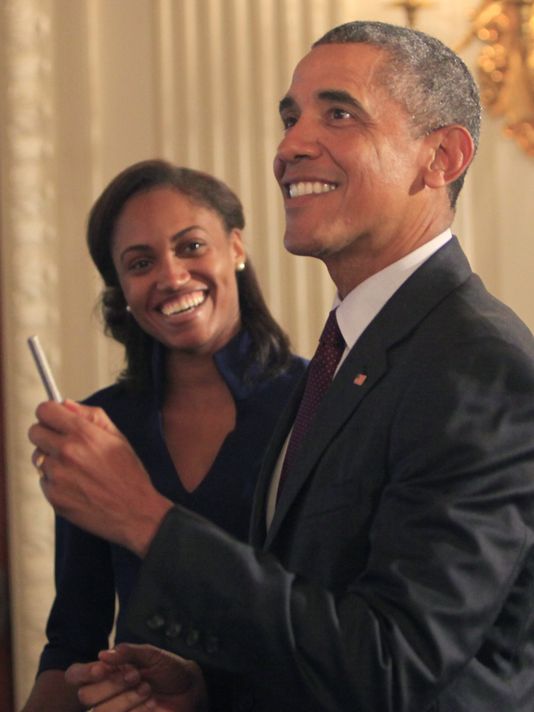
17 Aug Obama ’empowering’ for diversity in tech
WASHINGTON — Days after her conversation with President Obama, Jewel Burks still beams.
The entrepreneur from Atlanta, Ga., gained an audience with the president at the White House Demo Day on Tuesday. She and co-founder Jason Crain explained how they came up with the idea for Partpic, a replacement part recognition application that helps companies order the correct part to get their machines back in action.
Burks got the idea for the company after helping manage a parts call center and from an experience trying to help her grandfather get a replacement part for his tractor. “It was really tough,” she said. “I wanted to create an easier and more simple way for people to search for a part and that’s what really got it started.”
Currently, Partpic focuses on internal corporate solutions, but eventually shoppers could use the app to snap a photo of the spare part they need replaced and have an order filled by The Home Depot or Lowe’s.
The president “seemed genuinely interested in understanding our business and what we were all about,” Burks said. “It was probably one of the, if not the, best experiences of my life. It was amazing.”
Burks joined more than 30 other start-ups and 90 entrepreneurs invited as part of the administration’s initiative to spur inclusion in the tech industry.
Obama noted that less than 3% of venture capital-backed companies have women CEOs and fewer than 1% have an African American founder.
“Yet we’ve seen again and again that companies with diverse leadership often outperform those that don’t,” he said. “That’s the market that is out there — not just here in the United States, but globally. So that lack of participation from everybody isn’t good for business.”
The tech industry has begun to recognize the need to be more inclusive, Obama said, citing Pinterest and Intel’s stated goals of hiring more women and minority workers.
He announced several new public-private tech diversity initiatives including a pledge by more than 40 leading venture capital firms to increase diverse hiring and funding practices.
Diversity advocates Mitch Kapor and wife Freada Kapor will invest $40 million in several projects over three years as a way to give women and underrepresented minorities a better shot at becoming technology entrepreneurs. “We believe that our $40 million commitment will be a catalyst for others in the tech to match, so that a decade from now tech will look more like America,” Freada Kapor said.
Also, more than 100 deans at engineering schools have committed to more inclusive student recruitment. Obama announced an expansion of the administration’s TechHire initiative that connects local firms and public officials to hold diversity hiring and education events and additional cities joining the Startup in a Day program to make it easier for new companies to file the required permits and licenses to begin operation.
“I can’t wait to see what all of you end up doing,” Obama said. “And keep in mind that in about 18 months I’m going to need a job. … I’ve got some skills.”
The CEO of electronics recycling firm BlueOak, Priv Bradoo, said she was impressed with the president’s interest. “I think it is fantastic, the focus on diversity,” she said, “And the push to make a change comes right from the President’s office. That is incredibly empowering.”
Bradoo, who was born in India but went to school in Boston, co-founded the company, which reclaims gold and precious metals from computers, smartphones and other electronics and then recycles the materials. Gone un-recycled, electronics can leach toxic wastes into the environment. “I’ve been fortunate enough to work with pioneers in the manufacturing industry who really don’t see a gender or a color,” she said.
Pashon Murray, who demonstrated her Detroit Dirt business at the White House, has similar concerns about the environment. Her father owned a waste hauling company and she accompanied him on landfill visits. That inspired her to start a company that collects food waste from companies such as General Motors and recycles it as soil-enriching compost.
Advancements are needed in funding among minority and women-run start-ups, she said. “We are starting to get awareness, but I’m not going to say we’ve made a lot of progress,” Murray said. When it comes to getting loans from traditional banks, she said, “people who look like me in areas like (Detroit), aren’t the priorities.”
That’s why the administration focused on inclusive entrepreneurship and “accelerating access for all Americans,” U.S. chief technology officer Megan Smith said. “We have such an extraordinary history as a country in our entrepreneurship, we are the envy of the world, our ecosystems really support extraordinary companies and inventors and their teams,” she said. But the system hasn’t been “as inclusive as we need to be. We’ve always had founders and innovators from every group, men and women, people from all racial groups, of all ages, all parts of our country, but they haven’t always had access to the deep entrepreneurial resources like venture capital and other pieces at the same rates as each other.”
The breadth of organizations and investors committed to helping change that impressed Burks. “It was a great event that put this on the forefront,” she said. “It just really showed that there is a lot to say about diversity in tech and there are great ideas coming from everywhere. So it’s really important that everyone wakes up to that fact.”


michaelhallTM
Posted at 14:45h, 17 AugustObama ’empowering’ for diversity in tech
#digigrass #w3rtech http://t.co/e8Tq33m1fQ